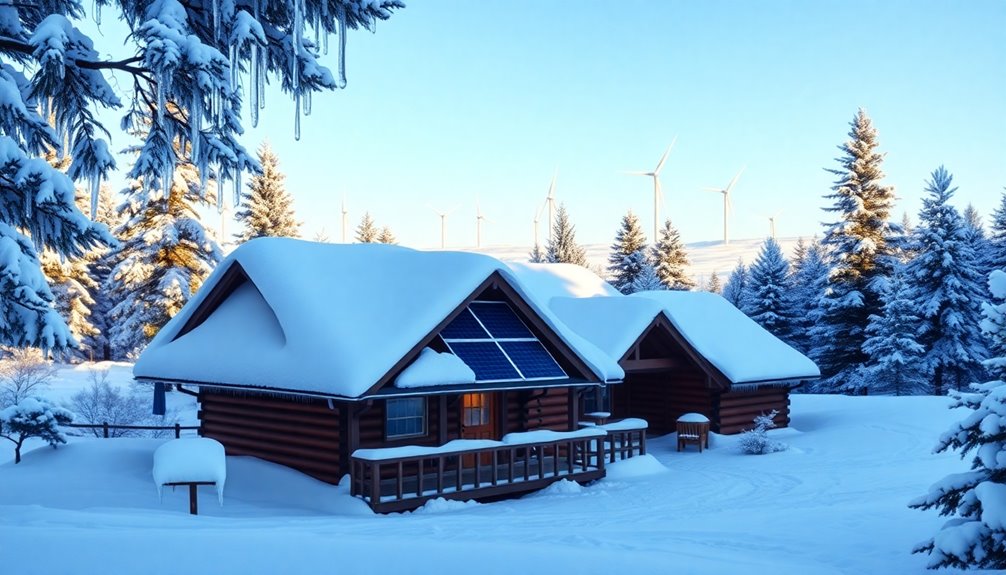Winter off-grid living is a fun challenge, and you can keep your power strong through the cold! Start by placing your solar panels at the right angle to catch the winter sun and clear off snow to boost energy production. Don't forget to keep your batteries warm and check your generator regularly to keep everything running smoothly. Using energy-efficient appliances and improving insulation in your home can help trap warmth and lower your energy use. Explore online communities for tips and tricks on making your winter experience more enjoyable and find plenty of helpful advice along the way!
Key Takeaways
- Optimize solar panel positioning by adjusting the tilt and clearing snow to maximize sunlight exposure during winter months.
- Implement thermal management strategies, such as improving insulation and using thermal curtains, to retain heat and reduce energy consumption.
- Regularly monitor and maintain battery performance, ensuring optimal temperature and charge levels to mitigate cold weather effects.
- Utilize smart appliances and energy-efficient devices to lower power consumption during peak usage times in winter.
- Engage with online communities and local workshops for tips and support on off-grid living during cold weather.
Solar Panel Positioning Strategies

When it comes to maximizing your solar energy production in winter, the right positioning of your solar panels is key. You want to make sure your panels are angled just right to capture as much sunlight as possible. A good tip is to adjust those tilt-adjustable mounts to your latitude plus 15 degrees. This helps optimize sun exposure during those chilly, cloudy days! Additionally, incorporating a heat pump system can further enhance efficiency by improving the overall indoor air quality of your home while utilizing renewable energy sources for heating. These systems can also significantly reduce energy costs, making them a valuable addition to your off-grid setup. Coastal zones, which are often affected by wave action, can also serve as natural indicators for effective solar panel placement due to their unique geographic features.
Don't forget about snow! It's important to clear any snow or ice from your panels whenever the sun shines. Even a little bit of snow can block sunlight and reduce energy production. Regular maintenance, much like that required for heat pumps, is also crucial for optimal performance. Regular check-ups can prevent the majority of heat pump issues before they escalate.
Also, keep an eye on any nearby trees or buildings. Their shade can really cut down on how much energy your panels can capture. This is especially pertinent in commercial settings, where energy-efficient technology plays a vital role in maximizing output.
As seasons change, your solar panel positioning should change too. The sun's path is lower in winter, so adjusting your panels to catch those rays is vital.
Maintaining Battery Performance

Cold weather can be tough on your battery performance, so it's crucial to monitor charge levels regularly. When temperatures drop, your battery's energy storage capacity can shrink, making it more challenging to keep everything running smoothly.
For lithium-ion batteries, they can handle temperatures from -4°F to 122°F, but lead-acid batteries need special care. Keep those in ventilated, sheltered spots to avoid freezing! Additionally, heat pumps can be integrated into your system to provide a reliable source of warmth, which can further protect your batteries from extreme cold. Ensuring the right air filtration technology in your battery storage area can also help maintain optimal conditions. Furthermore, implementing predictive analytics can help you anticipate battery performance issues during cold spells. Just like in Paula Deen's wedding, attention to detail and planning can ensure a successful outcome.
You can help maintain battery performance by insulating your battery storage area, aiming for a cozy 60°F. This simple trick can make a big difference!
Don't forget about regular equalization charges for your lead-acid batteries during the winter. This keeps them healthy and prevents problems like acid stratification, which cold temperatures can worsen.
If you're using lithium-ion batteries, a battery management system (BMS) is a must-have. It keeps an eye on temperature extremes and guarantees you're charging under the best conditions. Additionally, ensuring your system is integrated with geothermal heat pumps can further enhance energy efficiency and reduce reliance on battery power in colder months.
Generator Care and Readiness

Ensuring your generator is ready for winter requires proactive care and maintenance. Start by regularly checking the oil, coolant, and air filters. This helps your generator run smoothly during cold weather, which can sometimes cause maintenance issues. Additionally, using a high pressure airless paint sprayer can help maintain a consistent finish if you're working on exterior projects during winter. It's also essential to ensure that your generator is located a safe distance from combustibles to prevent any fire hazards. Moreover, regular maintenance checks can help identify potential issues before they lead to mechanical failures. Additionally, keeping your generator in a weatherproof enclosure will protect it from the elements and extend its lifespan.
You should also inspect the starter battery. Cold temperatures can zap battery performance, so make sure it's charged or replace it if it hasn't been used lately.
Don't forget to run your generator monthly! This keeps it in peak condition and prevents fuel from going bad, which can lead to starting troubles when you need it most.
Storing your generator properly is just as important. A weatherproof enclosure will protect it from snow and ice, ensuring it stays functional and safe.
Lastly, always follow the manufacturer's guidelines for winterization. They'll have specific maintenance tasks that'll help your generator perform reliably in extreme conditions. Additionally, ensuring proper airflow around the unit will enhance its performance during winter months.
With these winter preparations in place, you'll have peace of mind knowing your generator is ready to tackle whatever winter throws at you!
System Monitoring Essentials

As winter approaches, keeping a close eye on your off-grid power system becomes essential for maintaining efficiency and reliability.
You'll want to regularly monitor system components, like solar panels, batteries, and generators, at least once a month. This helps you spot any wear or issues before winter sets in. Additionally, being aware of state tax implications on any income generated from your off-grid system can help you plan effectively. Regular monitoring of indoor air quality is important, especially during winter when windows are often closed, leading to potential buildup of pollutants. Consider implementing best home security systems to further protect your off-grid setup during the colder months. Keeping your indoor air quality in check can also enhance overall health, as air purifiers are effective in reducing allergens and improving the living environment.
Using battery monitors and temperature sensors is a smart way to track your battery's charge state. This guarantees your batteries stay charged under ideal conditions, preventing freezing and acid stratification in lead-acid batteries.
It's also important to keep solar charge controllers active during winter. Adjust their settings to match the reduced sunlight and colder temperatures. This way, you can maximize energy collection and battery charging.
If you're away for a while, think about installing automatic generator start systems. They help maintain battery charge levels, guaranteeing your system stays functional throughout the winter.
Finally, use performance tracking tools to check energy production and usage. This helps you make timely adjustments and maintain your off-grid system's efficiency during those chilly winter months. Additionally, consider the financial implications of assisted living expenses as you plan for any potential long-term care needs that may arise.
With the right system monitoring, you can enjoy a warm and cozy winter off the grid!
Energy Efficiency Techniques

When it comes to saving energy this winter, using smart appliances and managing heat can make a big difference!
You can keep your home cozy by using thermal curtains to trap warmth and running appliances during off-peak times when energy is cheaper. Additionally, consider investing in energy-efficient appliances that help reduce overall consumption while maintaining performance. Implementing heat pumps can further enhance your home's energy efficiency by utilizing renewable energy sources for heating and cooling. Regular maintenance and annual professional inspections of heat pump systems ensure optimal performance and longevity. Additionally, exploring renewable energy sources can provide sustainable solutions for your home heating needs. Moreover, utilizing solar energy can complement your heating strategy by harnessing the sun's power even in winter months.
Let's explore some fun ways to be energy-efficient, so you can enjoy a warm and happy winter without wasting power!
Smart Appliance Usage
In winter, optimizing your energy consumption is essential for off-grid living, and smart appliance usage plays a key role in achieving that. By using smart thermostats, you can easily adjust your heating from anywhere, saving you 10-15% on heating bills. Imagine coming home to a cozy space without wasting energy!
Switching to energy-efficient lighting, like LED bulbs, can reduce your power use by up to 75%. That means more light and less stress on your battery capacity! Additionally, focusing on emotional alignment can help you maintain a positive mindset while managing energy resources effectively. Moreover, choosing products with high energy efficiency ratings ensures that you're making the best decisions for your energy use. It's also important to be aware of potential side effects and interactions when using various appliances that may draw more power than expected. For example, ensuring your devices have low input lag can lead to better performance without unnecessary energy waste.
Investing in Energy Star appliances is another smart move. They're designed to be energy savers, cutting your energy costs by 10-50%.
Load management is important too! Try running your high-energy appliances during sunny days. This way, you can maximize solar energy and use less battery power.
And don't forget about smart power strips! They can help eliminate phantom loads—those sneaky energy drains from devices not in use—saving you up to 10% on your total energy consumption. Additionally, using an air purifier can enhance indoor air quality and contribute to overall well-being, making your off-grid living space more comfortable during the winter months.
Thermal Management Strategies
Effective thermal management is essential for maintaining comfort and efficiency in your off-grid home during winter months. By making insulation improvements, you can cut your heating loads by up to 30%! This means the heat you generate stays cozy inside where it belongs. Additionally, a well-organized space can enhance your overall comfort, allowing you to enjoy your home fully during the colder months while reducing distractions.
You can also think about using thermal mass materials, like concrete or brick, to help hold onto that warmth overnight. This approach aligns with the idea of mindful organization, as it emphasizes the value of creating a serene environment that supports your well-being. Proper insulation not only enhances comfort but also contributes to energy efficiency ratings by improving your home's overall performance. Incorporating low-cost custodians for your investments can provide additional financial stability to support your off-grid lifestyle.
Energy management is key too! Try using energy-intensive appliances during sunny hours when your renewable energy system is working hard. This helps balance your energy usage and keeps your batteries happy. Moreover, setting clear goals for your energy use can streamline the process and lead to a calmer atmosphere in your home.
Plus, upgrading to high-efficiency appliances, like those with ENERGY STAR ratings, can lower your energy consumption by 10-50%. By prioritizing energy efficiency, you're not only saving on costs but also contributing to a more sustainable living environment.
Don't forget about weather-resilient insulation! Materials like spray foam and reflective barriers can minimize heat loss, improving your overall energy efficiency. Implementing these solutions can also encourage a greater appreciation for your living space and the value of quality materials.
In addition, opting for cleaner fuel options, such as renewable energy sources, can further enhance your energy independence and reduce environmental impact. This mindful approach supports a holistic lifestyle and fosters a deeper connection with your home and surroundings.
With these thermal management strategies in place, you'll stay warm and use less energy in your off-grid home. Embrace the cold with a happy heart, knowing you're doing your part for the planet while keeping your space snug and inviting!
Preparing for Winter Challenges

Winter poses unique challenges for off-grid living, and preparing well in advance can make all the difference. To enjoy a cozy and safe winter, you'll want to tackle a few important tasks. Here's a handy list to help you get started:
- Check Your Systems: Begin maintenance checks on your solar panels, batteries, and other energy systems by September. This way, everything will be ready before the first snow falls. Additionally, ensuring your systems are compatible with renewable energy sources can optimize their efficiency during winter months. Incorporating grassroots programs focused on energy solutions can provide valuable insights for off-grid living. Moreover, consider integrating inflation-protected annuities if you're looking for long-term financial stability to support your off-grid lifestyle.
- Insulate Batteries: Make certain your battery storage areas are insulated. Cold temperatures can hurt battery performance, so keep an eye on them throughout winter. This will help maintain their efficiency and prolong their lifespan.
- Stock Up Supplies: Gather food, fuel, and water ahead of time. You never know when a snowstorm might hit, so being prepared guarantees you stay self-sufficient.
- Plan for Power: Create backup plans for severe weather. Think about alternative heating solutions and how you'll use generators if needed. Additionally, consider implementing eco-friendly practices that can help minimize your carbon footprint during the colder months.
Also, remember to clear snow off your solar panels regularly. Snow can block sunlight and reduce energy absorption, so keep those panels shining bright!
Resources for Off-Grid Living

When you start your off-grid journey, it's super helpful to tap into online communities and forums where you can connect with others who are living the same way. You'll find tons of guides and tutorials that break down everything you need to know about your new systems. Additionally, understanding renewable energy sources can empower you to choose the best solutions for your energy needs. Plus, local workshops can give you hands-on experience and advice, making your off-grid life even easier and more fun! Engaging in STEM education can enhance your problem-solving abilities, which are crucial for managing off-grid systems. Additionally, consider joining local clubs that focus on off-grid living to gain more insights and support from experienced individuals in your area. Engaging with these communities can significantly enhance your mental resilience, helping you adapt to the challenges of off-grid living. Furthermore, leveraging data analytics can help you make informed decisions about your energy consumption patterns and resource management.
Online Communities and Forums
Online communities and forums serve as invaluable resources for anyone maneuvering the complexities of off-grid living, especially during the winter months.
These platforms connect you with fellow enthusiasts who share tips and advice on winter power solutions and other challenges. Here are four great ways to get involved:
- Join Subreddits like "Off-Grid Living" or visit "Permies" for shared experiences and advice.
- Explore Websites such as "Solar Panel Talk" and "The Renewable Energy Forum," where you can learn about solar technology and winter maintenance practices.
- Participate in Facebook Groups dedicated to off-grid living, where you can ask questions and find local support for energy efficiency strategies.
- Check Out DIY Forums like "DIY Solar Energy" for project ideas to optimize your solar setups and integrate wind energy solutions for colder conditions.
These online communities not only enhance your understanding of battery performance and renewable energy but also provide a space to connect with others who share your passion. Additionally, gaining insights into cybersecurity measures can help protect your off-grid systems from potential vulnerabilities.
Educational Workshops and Tutorials
Many people find that educational workshops and tutorials provide hands-on experience and practical knowledge that online communities alone can't offer. When it comes to off-grid living, these workshops teach you important skills, like solar power installation and battery maintenance, especially for winter conditions.
You'll get to work with real materials, helping you understand how to set up and troubleshoot your off-grid systems. Local community centers and organizations often host these workshops. You'll meet experts and fellow off-grid enthusiasts, creating a friendly space to share tips and experiences.
Many workshops also provide useful resources, like detailed guides and checklists. These tools help you learn how to keep your energy source running smoothly, even when it's cold outside. Online platforms offer webinars too, but nothing beats hands-on learning.
You can see how to prepare your solar energy systems for winter and optimize battery performance in chilly weather. By participating in these educational workshops, you'll build confidence and gain knowledge that makes off-grid living easier and more enjoyable.
Advancements in Solar Technology

As advancements in solar technology continue to reshape the energy landscape, you'll find that these innovations are particularly beneficial for off-grid living during winter months.
With the cold weather, it's crucial to have reliable energy, and these new technologies make that easier than ever! Here are some exciting developments:
- Lower Costs: The price of solar panels has dropped, making it easier for you to get started with solar energy.
- Improved Efficiency: New photovoltaic cells convert sunlight into energy more effectively, even in the lower light winter days.
- Smart Integration: Smart home technology connects with your solar system, helping you manage energy use efficiently, especially when it's chilly outside.
- Battery Innovations: Modern batteries, like lithium iron phosphate (LiFePO4), work great in cold conditions, making certain you have energy when you need it most.
These advancements in solar technology not only boost performance but also guarantee you stay cozy and powered up in winter.
Embracing these solutions means you can enjoy off-grid living with confidence, no matter how cold it gets outside!
Portable Power Solutions

When you're off-grid during winter, having reliable portable power solutions can make all the difference. Imagine cozying up in your cabin, knowing you have power to keep your devices charged!
Portable power solutions, like EcoFlow's DELTA and RIVER, are perfect for cold weather. These handy gadgets use high-performance lithium-ion batteries, which work better in low temperatures compared to old lead-acid batteries.
You can even use solar panels to charge your portable generators, harnessing sunlight even during those chilly winter months. Many solar generators can operate in temperatures as low as -4°F, so you won't be left in the dark.
With smart features, you can monitor your battery charge from your phone, making it easy to manage your energy use.
Whether you’re camping or preparing for an emergency, these portable power solutions guarantee you have the energy you need. So, pack your solar panels and portable generator for a fun winter adventure, and enjoy the great outdoors with confidence! With the right equipment, you can sustain your energy needs while exploring remote areas or riding out unexpected situations. For those who prefer a more permanent solution, consider integrating DIY power systems for homesteaders into your setup to become even more self-reliant. Whether it’s harnessing solar energy or utilizing wind power, these systems can enhance your outdoor experience and provide peace of mind throughout the winter months.
You'll be ready for anything, and that's a warm thought!
Frequently Asked Questions
How Can I Insulate My Off-Grid Home for Winter?
To insulate your off-grid home for winter, start by sealing gaps around windows and doors with weatherstripping.
You can add thick curtains to keep the cold out and warmth in!
Insulate your walls and attic with foam board or fiberglass.
Don't forget to use rugs on chilly floors; they make your space cozy!
Finally, check your heating system to guarantee it works well.
You'll be warm and snug all winter long!
What Are the Best Heating Options for Off-Grid Living?
When you think about keeping warm off-grid, imagine a cozy cabin in the woods!
You've got some great options. Wood stoves create a lovely crackle and warmth, while propane heaters are easy to use and efficient.
Solar-powered heaters can also help, especially with sunny days.
Don't forget about thick blankets and warm clothes to snuggle up in!
With these choices, you can make your off-grid home feel like a warm hug all winter long!
How Do I Prevent Snow Accumulation on Solar Panels?
To keep snow from piling up on your solar panels, you can gently brush it off with a soft broom.
If the sun's shining, the warmth might melt it away! You could also install panels at an angle, making it harder for snow to stick.
Some folks use heated cables, too. Just remember, a clean panel catches more sunlight, so keeping them clear helps you get that energy you need!
What Are Common Winter-Related Power Outages?
During winter, power outages can happen for several reasons! Heavy snow or ice can weigh down power lines, causing them to snap.
Strong winds might knock down trees, which can also take out power lines.
Sometimes, a blizzard can make it hard for repair crews to reach damaged areas.
If you're prepared, you can stay cozy and safe even when the lights go out.
Isn't it great to be ready for winter surprises?
How Can I Track My Energy Usage Effectively?
Tracking your energy usage is like keeping score in a fun game! Start by using a simple energy monitor; it shows how much power each appliance uses.
You can also jot down your usage in a notebook or on an app. Look for patterns, like when you use the most energy.
Conclusion
You can totally thrive off-grid during winter! Even if you think the cold will make it tough, with the right strategies, like smart solar panel positioning and keeping your batteries happy, you can stay cozy and powered. Just remember, it's all about planning and being prepared. So, don't let the chilly weather scare you away—embrace the adventure! With a bit of effort, you'll enjoy the beauty of winter while staying warm and bright.










